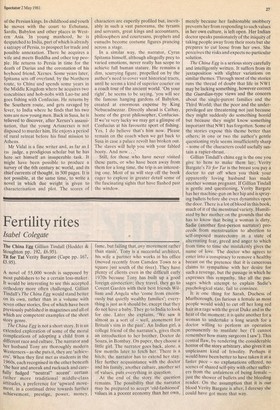Fertility rites
Isabel Colegate
The China Egg Gillian Tindall (Hodder & Stoughton pp. 192, £6.95).
Tit for Tat Verity Bargate (Cape pp. 167, £5.95).
A novel of 55,000 words is supposed by most publishers to be a certain loss-maker. It would be interesting to see this accepted orthodoxy more often challenged. Gillian Tindall's The China Egg would stand better on its own, rather than in a volume with seven other stories, five of which have been Previously published in magazines and all of Which are competent examples of the short story genre.
The China Egg is not a short story. It is an extended exploration of some of the moral Complications of adopting a child from a different race and culture. The narrator and her husband Tony are thoroughly modern Westerners — as she puts it, they are 'achievers'. When they first met as students in the 1960s, each recognised in the other beneath 'the hair and anorak and rucksack and carefully fudged "neutral" accent' certain rather more traditional middle-class attitudes, a preference for 'upward movement, in a continual drive towards further achievement, prestige, power, money, fame, but failing that, any movement rather than stasis'. Tony is a successful architect, his wife a partner who works in his office (moved recently from Camden Town to a square just south of the river). They have plenty of clients even in the difficult early 1970s because Tony has built up a 'good foreign connection; they travel, they go to Covent Garden with their best friends William and Angela who 'come from enormously but quietly wealthy families'; everything is just as it should be, except that they do not have a baby, They go to India to look for one. Later she explains, 'We saw it almost as a sort of — well, atonement for Britain's sins in the past', An Indian girl, a college friend of the narrator's, gives them an introduction to her brother, Doctor de Souza, in Bombay. On paper, they choose a little girl. The narrator goes back, alone, a few months later to fetch her. There is a hitch; the narrator has to extend her stay. Her further acquaintance with the doctor and his family, another culture, another set of values, puts everything in question.
At the end of the story the question remains. The possibility that the narrator may be prepared to accept 'old-fashioned' values in a poorer economy than her own, merely because her fashionable snobbery prevents her from responding to such values in her own culture, is left open. I-ler Indian doctor speaks passionately of the iniquity of taking people away from their roots but she prepares to cut loose from her own. She perceives the risks and expects no particular solution.
The China Egg is a serious story carefully and intelligently written. It suffers from its juxtaposition with slighter variations on similar themes. Through most of the stories runs the thread of doubt that life in NWI may be lacking something, however correct the Guardian-type views and the concern about the single-parent families and the Third World; that the poor and the underprivileged are threatening not just because they might suddenly do something horrid but because they might know something important that NWI has forgotten. Some of the stories expose this theme better than others; in one or two the author's gentle questioning style seems insufficiently sharp — some of the characters could usefully sustain a rapier-thrust.
Gillian Tindall's china egg is the one you give to hens to make them lay; Verity Bargate's Tit for Tat is the breast you pay a doctor to cut off when you think your apparently loving husband has made another woman pregnant. If Gillian Tindall is gentle and questioning, Verity Bargate has her machine-gun on her hip and is spraying bullets before she even dynamites open the door. There is a lot of blood in this book, much of it of the menstrual variety. Humiliated by her mother on the grounds that she has to know that being a woman is dirty, Sadie (another first-person narrator) proceeds from menstruation to abortion to self-imposed mastectomy in a state of alternating fear, greed and anger to which from time to time she mistakenly gives the name of love. The doctor who agrees to enter into a conspiracy to remove a healthy breast on the pretence that it is cancerous claims to sympathise with her desire for such a revenge, but the passage in which he expresses this sympathy, like all the passages which attempt to explain Sadie's psychological state, fail to convince.
It is one thing for Sarah, Duchess of Marlborough. (as furious a female as most people would wish) to cut off her long red hair in a rage with the great Duke and in the heat of the moment; it is quite another for a woman to undertake a long search for a doctor willing to perform an operation permanently to mutilate her CI cannot remember how many surgeons I saw'). This central flaw, by rendering the considerable horror of the story arbitrary, also gives it an unpleasant kind of frivolity. Perhaps it would have been better to have taken it at a faster pace — no explanations offered, no scenes of shared self-pity with other sufferers from the unfairness of being female — just the shower of bullets and the bleeding reader. On the assumption that it is our blood Verity Bargate is after, I daresay she could have got more that way.


















































































 Previous page
Previous page